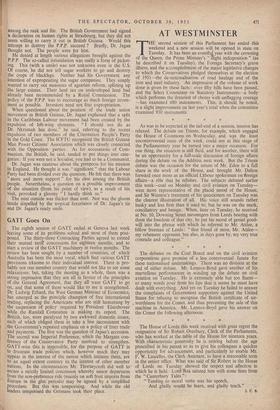GATT Goes On
The eighth session of GATT ended at Geneva last week leaving some of its problems solved and most of them post- poned. The thirty-three Contracting Parties agreed to extend their mutual tariff concessions for eighteen months, and to start a review of the GATT machinery in twelve months. The review has been sought, by a number of countries, of which Australia has been the most vocal, which find various GATT provisions irksome to their individual interest. There is pro- bably not one member country that would not like to see some relaxations; but, taking the meeting ,as a whole, there was a. strong impression 'that they are all in favour of the principles of .the General Agreement, that they all want GATT to go on, and that some of them would like to see it strengthened. Dr. Ludwig Erhard, the West German Minister of Economics, has emerged as the principle champion of free international trading, replacing the Americans who are still hamstrung by the suspension of policy' required by President Eisenhower while the Randall Committee is making its report. The British, too, were paralysed by two awkward domestic issues, each of which obliged them to take a line inconsistent with the Government's repeated emphasis on a policy of freer trade and payments. The first was the question of Japan's accession. The second was Imperial Preference, which the Margate con- ference of the Conservative Party resolved to strengthen. GATT-wise this is impossible, for the purpose of GATT is to frustrate trade policies which, however much they may appear in the interest of the nation which initiates them, are to an equal extent contrary tq the interest of other member nations. In. the circumstances Mr. Thorneycroft did well to secure a strictly limited concession whereby minor departures from the non-preference rule (mainly on soft fruit imports from Europe in the glut 'periods) may be agreed by a simplified procedure. But this was temporising. And while the old leaders temporised the Germans took their place.


































 Previous page
Previous page